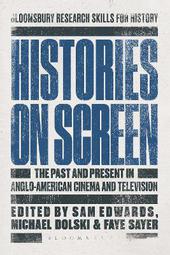
|
Histories on Screen: The Past and Present in Anglo-American Cinema and Television
Hardback
Main Details
| Title |
Histories on Screen: The Past and Present in Anglo-American Cinema and Television
|
| Authors and Contributors |
Edited by Dr Sam Edwards
|
|
Edited by Dr Faye Sayer
|
|
Edited by Dr Michael Dolski
|
| Series | Bloomsbury Research Skills for History |
|---|
| Physical Properties |
| Format:Hardback | | Pages:354 | | Dimensions(mm): Height 234,Width 156 |
|
| Category/Genre | British and Irish History |
|---|
| ISBN/Barcode |
9781474217040
|
| Classifications | Dewey:791.43658 |
|---|
| Audience | | Professional & Vocational | |
|---|
| Illustrations |
25 bw illus
|
|
Publishing Details |
| Publisher |
Bloomsbury Publishing PLC
|
| Imprint |
Bloomsbury Academic
|
| Publication Date |
8 February 2018 |
| Publication Country |
United Kingdom
|
Description
How, as historians, should we 'read' a film? Histories on Screen answers this and other questions in a crucial volume for any history student keen to master source use. The book begins with a theoretical 'Thinking about Film' section that explores the ways in which films can be analyzed and interrogated as either primary sources, secondary sources or indeed as both. The much larger 'Using Film' segment of the book then offers engaging case studies which put this theory into practice. Topics including gender, class, race, war, propaganda, national identity and memory all receive good coverage in what is an eclectic multi-contributor volume. Documentaries, films and television from Britain and the United States are examined and there is a jargon-free emphasis on the skills and methods needed to analyze films in historical study featuring prominently throughout the text. Histories on Screen is a vital resource for all history students as it enables them to understand film as a source and empowers them with the analytical tools needed to use that knowledge in their own work.
Author Biography
Sam Edwards is Senior Lecturer in American History at Manchester Metropolitan University, UK. He has published widely on the cultural history of twentieth century conflict. He is the author of Allies in Memory: World War II and the Politics of Transatlantic Commemoration, c.1941-2001 (2015), which was shortlisted for the Royal Historical Society's Gladstone Prize. Michael Dolski is a historian with the Joint Prisoner of War-Missing in Action Accounting Command's Central Identification Laboratory in the USA. Together with Sam Edwards and John Buckley, he is editor of D-Day in History and Memory: The Normandy Landings in International Remembrance and Commemoration (2014), and he is the author of D-Day Remembered: The Normandy Landings in American Collective Memory (2016). Faye Sayer is Senior Lecturer in Public History and Community Archaeology at Manchester Metropolitan University, UK. She has published extensively on the value of public history and community archaeology, and she is the author of Public History: A Practical Guide (Bloomsbury Academic, 2015).
ReviewsThis methodological book can be welcomed within undergraduate courses on the history of film ... [It] provides broad introductions to film history through the important lenses of nationalism, production, reception, commemoration, and historical memory. * Jhistory * Each chapter begins with a concise introduction, provides historical and historiographical context before moving into discussion of the particular film or television show, and often ends by exploring the specific material as a source ... [This] volume succeeds in providing educators with insights to use in the classroom. Summing Up: Recommended. All levels/libraries. * CHOICE * An accessible overview of core issues and approaches in this area, making it likely to be of interest to a more general readership, as well as scholars looking for an introduction to the way histories of and on screen have been examined and re-examined by historians. * Historical Journal of Film, Radio and Television * Sam Edwards, Michael Dolski and Faye Sayer are to be congratulated for bringing together such a fascinating set of essays. It is well known that people often understand the past by what they see on the screen, but we often don't stop to consider the processes behind the persuasive effect of film and television. The contributors to this volume bring the complexity of the relationship between consumer and producer of history on screen to light in a lively and engaging manner. * Mark Connelly, Professor of Modern British History, University of Kent, UK * Today most people learn most of what they know about history from films and television. This thoughtful, wide-ranging and stimulating collection of essays explores in depth how and why this is so. An invaluable contribution to our understanding of an often misunderstood cultural phenomenon. * Jeffrey Richards, Emeritus Professor of Cultural History, Lancaster University, UK *
|